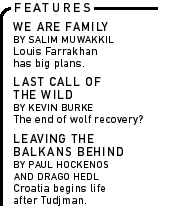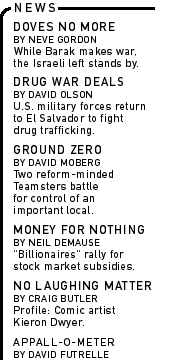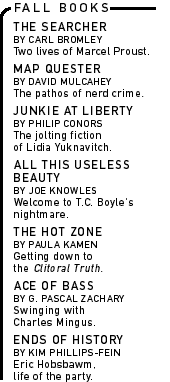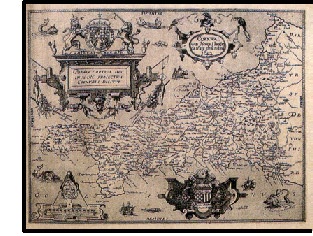
|

|

|

|
| |
 |
|
|
The Island of Lost Maps: A True Story of Cartographic Crime
There's something about libraries that, for all their storied power to enlighten and uplift, tends to bring out the basest instincts in people. During my brief stint shelving books in the vast University of Illinois library, I'd push a cart of books into some deserted corner in the dark, bunker-like stacks and fritter away taxpayers' money combing the shelves for exotic volumes to ogle. It was during one such foray that I was seized by the only real temptation I've ever felt
I didn't do it--admittedly, less out of respect for the Eighth Commandment than a deep-seated feeling that this sort of thing is an unforgivable act of cultural lese-majesty. Still, as the Good Book says, to lust in your heart is to lust in deed. I started to wonder if it was wise to let people like me in the stacks. The fact is, libraries are a rich but largely defenseless realm, neglected and in some ways in decline, brimming with antiquities ripe for the swiping. And given the speculative excesses of the markets in all things collectible, plunderers are likely more numerous than anyone imagines. One such freebooter is Gilbert Bland, whose brief career of archival larceny is chronicled in Miles Harvey's picaresque and thoughtful book, The Island of Lost Maps. (Disclosure: Harvey is an In These Times contributing editor.) Bland spent the early '90s traversing the continent with a razor blade and a phony university ID, plundering atlases for rare cartographic treasure. By the time he ran aground in 1995, he had amassed a horde of rare maps worth hundreds of thousands of dollars--and had done it so stealthily that many of the libraries he victimized cannot to this day say for sure what he got away with. Bland's saga, like all nerd crime, is tinged with pathos. What suited him for his line of crime was his surpassing blandness. To all the world he was just another generic khaki-and-blazer white guy punching the academic time clock. We meet him on his last heist, as he fidgets over an atlas in the reading room of Baltimore's Peabody Library. He's nervously aware of the attention being paid to him by another patron, yet he goes about the business he has carried out countless times before. By degrees it becomes clear that he's being watched in earnest. When security officers enter the room, Bland heads out the door. An absurdly fitting "low-speed chase" ensues, and Bland is cornered in the portico of a Baltimore landmark. In the notebook he has ditched in some bushes are four purloined maps. Oddly enough, Bland left Baltimore a free man. After forking $700 out of his wallet to pay for the damage, Bland walked away--humiliated, perhaps, but inscrutable. Just what kind of man Bland was only became clear when a library employee discovered another notebook he left behind. In its pages was an extensive hit list, stunning evidence of the devastating scope of his crime. But in the margins there was something else, short diaristic squibs--"Am I not going to get these Bowens? What [will] become of me?"--little clues that Gilbert Bland was not your run-of-the-mill criminal. Everything about his case makes you want to know what makes Bland tick. The possible explanations are many, and as you might guess, the good old-fashioned pecuniary motive doesn't quite get to the heart of it. No, there's something about the object of Bland's obsession, about maps themselves--their rich mythological significance, their secret histories, their abiding power over human destiny--and it drove Harvey to develop an obsession of his own, a cartographic mission that dominated his life for several years, in which the terra incognita was Bland. And yet, as Harvey discovered, Bland is a point on the map that can never be found. Intensely private, he aggressively resisted the author's cordial solicitations for interviews. (Bland is back home in Florida after spending just under a year and a half in jail in two states.) From what evidence Harvey could cull from public records, Bland has spent his life fleeing bad luck--or mixed luck, you might say. From a teen-age theft arrest to service in Vietnam and a court-martial, from small-time fraud charges to the failure of a legitimate business, Bland's life was a story of getting in the soup and then somehow getting off lightly. He's courteous, reasonably intelligent and able, and he knows how to work the system. And yet he can't quite keep on the right side of the law. Beyond these bare facts Bland remains a cipher, and that seems to have troubling consequences for The Island of Lost Maps. For one thing, the protagonist of Harvey's book--and it is as much an adventure narrative as it is investigative journalism--becomes the author himself. It's a trend in contemporary creative nonfiction that usually walks the wrong side of the line between poignant and grating. Early in the book one wonders if it's a line Harvey shouldn't cross. It turns out, however, that Harvey has good reasons to make this book so personal (and to reveal them here would give too much away). Moreover, his skill as a writer, as well as his sympathy and enthusiasm, carries it off. Another problem presented by Bland's inaccessibility is that it makes forensic analysis speculative at best. Harvey offers interesting suggestions about the ways in which Bland's obsession with maps may relate to his troubled childhood. He also plumbs the psychology of collecting, the political economy of mapping, the cut-throat world of the antiquities trade, and other relevant contextual issues. Harvey is confidently in his element here. He's eloquent, inventive and expert in his use of scholarly sources and interviews, but he still leaves the reader with no hard and fast conclusions about Bland. This takes nothing--or very little--from the book. If anything, Harvey's equivocal speculations highlight the antinomies inherent in the very stuff Bland was stealing. Maps opened new worlds of understanding and advancement, but they were also blueprints for despoliation and expropriation. To pore over an antique map is to glimpse the alien but vaguely reminiscent world we left behind; to price one is to feel the alienation of the present world in full force. Do we, the ones who may feel the temptation to swipe archival treasure but never follow through, perhaps harbor delusory ideals about what all this stuff, these books and maps and art objects, these accretions of power and authority, really mean to the world? It's possible that Bland ripped off maps because he wanted to find
a way back to the part of his childhood before things fell apart.
And it certainly is true that when Bland slashed his maps out of
their archives, he was re-enacting "the whole long saga of New World
exploitation." It may also be that, if Gilbert Bland ever gets his
hands on this book, he'll read it in utter bemusement. But that's
OK, because the book is really about us.
|

